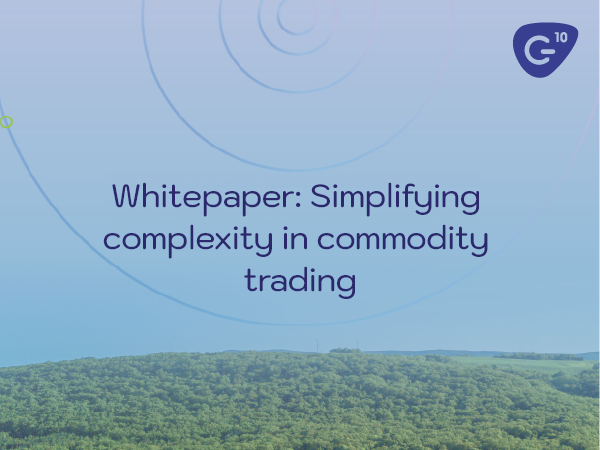All commodity trading involves managing complex operations. Moving commodities from areas of production to areas of scarcity or demand means managing and pricing risk across global supply chains. And every commodity has its own specific risks around quantities, quality, counterparties, logistics, and other areas.
This complexity can also mean that your team are working within complicated processes to manage not only their day-to-day roles, but also to report and manage the various risks. They are also usually working across multiple systems, including a CTRM, ERP, contract manager, logistics services, and possibly others. Every additional point of copying information between systems introduces that extra complexity and therefore more operational risk into the business.
What is operational risk?
Operational risk is the risk of losses caused by poor processes or people failing to follow processes, as well as any policies, systems and events that cause business disruptions. It is specific to the company, rather than an external event that affects the market or market segment, so can include physical events such as a power outage at your office, but most operational risk is due to human factors.
Human errors can occur whenever people are involved in processes. In commodity trading they may include copying information incorrectly, making the wrong decisions, inadvertently or intentionally not following processes, or even people setting up processes that don’t match the company’s actual workflows – leading others to avoid or work around the formal processes.
There is no way to completely eliminate either human error or operational risk more broadly, but managing it well can seriously reduce the risk and its potential impact on your business when things do go wrong.
How CommOS supports operational risk management
Operational risk is not an area that traditional CTRM systems used to support. However, CommOS from Gen10 is a comprehensive commodity management system. As well as the features you expect from a modern, cloud CTRM, it incorporates logistics management functionality so that you can run your entire business in one place. CommOS also includes customisable process automation which speeds up activities, ensures processes are followed and reduces typing & copying errors.
CommOS also integrates with other software, so that you can combine all your systems into one connected commodity management ecosystem. This integration means that there is no need to copy information, reconciliation is instant, and if errors do occur, they can be easily traced, with no need to spend hours tracking back across multiple systems.
And as well as operational risk, these integrations can play a significant role in mitigating other risk factors. For example, credit lines in CommOS update throughout the day based on information changing in the connected ERP, meaning there is less exposure to credit and counterparty risk.
Automated workflows
CommOS includes several automated process controls, including approval workflows that ensure action can’t be taken until the appropriate approvals have been granted. These workflows make things faster and easier for your team, so they see an instant benefit, whilst you can be sure that your processes are clearly communicated and being followed.
It also includes automated document creation, reducing the risk of mistakes in contracts and shipping documents, and can automatically share these documents with the appropriate counterparty or e-signature platform, again reducing the risk of communication errors.
This automated document creation includes pricing and valuation calculations which means that the risk of traders accidentally miscalculating pricing based on quality data or team members inputting incorrect data is greatly reduced. And this pricing can be recalculated with a click, based on information received directly from a connected system or an uploaded document, again reducing the risk of copying and calculation errors throughout the supply chain.
Risk controls
There are also multiple controls within the workflows to manage risk. For example, CommOS includes checks that allocations are within tolerance, as well as alerting your team to activities that haven’t been completed. So your workflows could alert a team member if contracts haven’t been returned within your timeframe, approvals haven’t been granted, or counterparty certificates are due to expire.
The workflows prevent the risk of offline workarounds introducing operational risk back into your business by giving your team the flexibility to ensure the workflows match your optimal workflows, however your people work best.
They can also take different circumstances into account to ensure that there is no need for activities outside of your agreed processes. This can include scenarios from calculating and recalculating ore and concentrates valuations based on a wide range of assays within a contract, to ensuring cotton traders have workflows to automatically manage the rejection of lots that do not meet all the contract quality requirements.
This flexibility avoids the risk of offline processing, such as your team managing tasks on spreadsheets, and all the risks this creates. These include the risks of multiple versions of the same spreadsheet, broken or incorrect formulae, team members accidentally damaging or otherwise corrupting data, and making mistakes when copying data across spreadsheets or systems.
Knowledge and decision making
One of the major contributors to human errors in business is staff not having the knowledge they need to follow your set processes. The advantage of CommOS is that the workflows mean that your team need less knowledge to be able to follow your processes as the workflows mean that it is very difficult to inadvertently ignore the correct procedures. As the workflows keep your people working within your processes, your team need less training to get up to speed, meaning new team members can hit the ground running and there is less disruption overall from team member queries.
Your team also have unparalleled access to real-time information and can use this knowledge to make the best decisions, across trading, operations and risk teams. Because all teams and systems are interconnected, everyone has access to the live information they need, so can make decisions based on the actual situation in the moment without the need to check in with other teams. As well as providing this information live, CommOS also reduces the risk of reporting errors as the reports are based on actual system information, rather than data that has been manually copied into a separate report.
Your team also have all the KYC and due diligence information they need to make informed decisions. Your team can pull together information from all your different data sources to assess each counterparty and each trade. So as well as any initial due diligence data, your team could check for any late payments or shipping delays to help them assess the reliability of a given counterparty on an ongoing basis.
Audit tools
Because all processing is carried out within your one commodity management ecosystem, all activities can be tracked in the audit log that CommOS automatically creates as your people go about their tasks. This means that if something does go wrong, you have complete traceability and can identify the error more quickly, with less disruption. This also allows you to identify whether process improvements are needed or what other actions should be taken to prevent similar situations arising in future.
Conclusion – operational risk can be mitigated
Operational risk is a fact of life for any commodity trading organisation. It can never be fully eradicated, but having the right commodity management technology in place can mitigate it far more than you might expect. CommOS from Gen10 supports your organisation in reducing operational risk in many ways, all driven by powerful automation that helps your team work more effectively as well as reducing risk. Trading, risk, and logistics teams can all benefit from using CommOS to make their lives easier, improve processes, and reduce operational risk, too.
If you’d like to find out more about how CommOS can support your business, get in touch with us today.
Want to read more?
Subscribe now for monthly updates
By submitting your details you agree that we can store your data and communicate with you. You can opt out of these communications at any time. Read all in our Privacy Policy.



